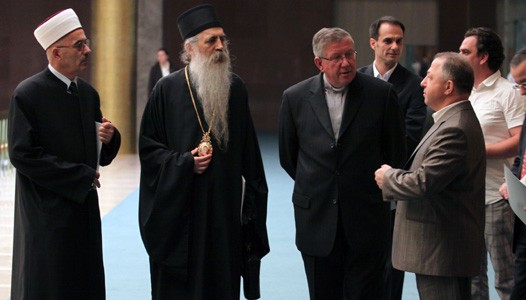Inter-religious Council of the Ministry of Faith of the Republic of Serbia established
 Today on June 17, 2010 in Belgrade a Inter-religious Council of the Ministry of Faith of the Republic of Serbia was established, and it consists of Prof. Dr. Bogoljub Sijakovic, Minister of Faith of the Republic of Serbia; Bishop Dr. Irinej Bulovic of Backa; Stanislav Hocevar, Archbishop of Belgrade of the Roman Catholic Church in Serbia; Reis-ul-ulema of the Islamic Community of Serbia Adem Zilkic and Rabbi Isaac Asiel, chief rabbi of the Jewish Community in Serbia. The Inter-religious Council is open for further appointments of members from among the dignitaries of the traditional churches and religious communities and prominent lay people.
Today on June 17, 2010 in Belgrade a Inter-religious Council of the Ministry of Faith of the Republic of Serbia was established, and it consists of Prof. Dr. Bogoljub Sijakovic, Minister of Faith of the Republic of Serbia; Bishop Dr. Irinej Bulovic of Backa; Stanislav Hocevar, Archbishop of Belgrade of the Roman Catholic Church in Serbia; Reis-ul-ulema of the Islamic Community of Serbia Adem Zilkic and Rabbi Isaac Asiel, chief rabbi of the Jewish Community in Serbia. The Inter-religious Council is open for further appointments of members from among the dignitaries of the traditional churches and religious communities and prominent lay people.
Minister of Faith Bogoljub Sijakovic pointed out the tasks of the Inter-religious Council: affirmation of religious freedom and religious culture, publishing communiqués (epistles) on important social issues, organizing scientific meetings, panels, round tables and advice on current topics, participation in the preparation of normative solutions, reviewing and interpreting of the tendency of public life, considering the importance of religious freedom and religious culture in the European context.
Bishop Irinej of Backa on the beginning emphasized that he gladly accepted the membership in the body which had not existed before in Serbia, and which operated within the Ministry of Faith which fulfill its role in a broad set social dialogue. "Participation in the Council is an expression of responsibility of all of us and conciliar confrontation with the problems of today. In the European Union there is a permanent and institutional dialogue, and in Serbia that need should be fulfilled by the Inter-religious Council. In our case, the Council differs from the same institutions within the Governments of the countries in our neighborhood, because its foundation was not caused by turbulence, but by the permanent need for a dialogue in the society. This body is not a political body, but has a responsible social function because it confronts with the problems of the people, the state and the society. Such cooperation has existed in our region for many years in the widest possible context. Dialogue is in nature of all Churches and religious communities, but more important is to have a living dialogue that is felt in society every day, in the context of answering on all the questions of contemporary society. Engagement of all of us - not just the members of the Council, but also associates and friends - should provide the answer to all social questions."
Monsignor Stanislav Hocevar expressed a joy because he was a member of the Inter-religious Council, because the inter-religious dialogue is a fundamental duty of all of us as the Churches and communities played the important role in the society.
Reis-ul-ulema of the Islamic Community of Serbia Adem Zilkic pointed out that the faith was life and the faith was hope. To believe meant look at all segments of life, hence the Churches and the religious communities should participate in social problems and assist in building a prosperous society.
Isaac Asiel, chief rabbi of the Jewish Community in Serbia, emphasized that the builder of peace was the teacher who built peace, and these are all representatives of the religious traditions. Rabbi also pointed out that all representatives of the Churches and the religious communities received a greater responsibility thanks to the establishment of the Inter-religious Council, hence on his behalf and on behalf of all members of the Council he thanked Minister Bogoljub Sijakovic, the Ministry of Faith and the Government of the Republic of Serbia.

